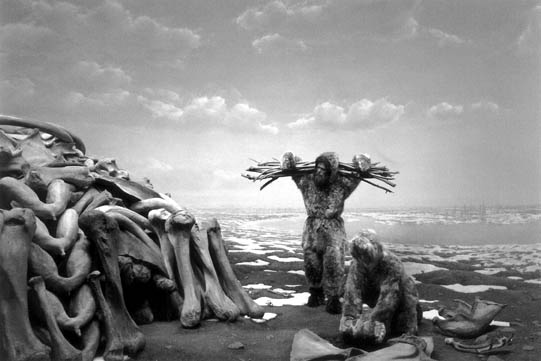
Hiroshi Sugimoto
I recently mentioned and referenced Ruth Fowler’s sharp and amusing take on the Sindead O Connor open letter to Miley Cyrus. Now, over at Counterpunch, Jeff St.Clair has redacted the, apparently, offending sentence or two and issued an apology. A fawning apology. It strikes me that as the society becomes ever more violent and toxic, the language must become ever more pure and chaste.
This is coupled, again, to the idea of hurt feelings. Jesus fucking god, is everyone just offended all the time about everything?
I hated the racism in Captain Phillips, the Hanks vehicle and ode to commercial shipping, but Im not “offended” by it. Every time I see Joe Lieberman I might be queasy but my feelings are not hurt. Anyone who has worked in theatre knows that one must quickly develop a very thick skin. John Simon once wrote of me,
“For sheer excrutiating boredom, nothing will ever equal Mr Steppling’s new play”. Who you calling Mister? The point is, fuck John Simon. Who cares. I still write and he’s long into his dotage. A nasty feral sort of man, and a terrible critic, but probably worth more consideration than either Miley or Sinead. I mention this because I wonder at people who read Fowler’s piece and wrote letters of complaint? What drives such indignation exactly?
“I am offended by Ms Fowler’s use of the term “cunt””. Im imagining that is the sort of irate letter St Clair recieved. So…here we have all this energy devoted to the material sourced by a Miley Cyrus performance. Think about that. Daughter of Billy Ray.
The real aggression in this discussion lies with O’Connor’s condescension and used car salesmen sincerity. This sort of faux concern is far more offensive and angry then Fowler’s aside to “kick her in the vagina”, a comment made with a fair amount of comic intent. If a male writer had said kick him in the nuts, most people would chuckle. Such sort of male bonhomie passes for sublimated affection with men. But this culture can no longer read tone. This is the Asperger’s effect, where the culture seems unable to distinguish layers of meaning and feeling. O’Connor was acting out a sort of text book passive-aggressive posture.

Billy Ray Cyrus
But I do think that one of the problems in the public reading of politics has to do with this schizoid break between public and private, and also between the “present” and the forgotten past, or history. The interesting thing is, though, what and how exactly does this ‘public’ narrative function and inform? I suspect that as the political theatre of debt crisis and Republican star turns on the great stage of malignant idiocy that is the U.S. government, that most people…or at least a lot of people, sort of impose this very simplistic and almost crude template on the story. If you asked the average American what socialism was, they would give you very odd answers (I know, I’ve asked) and if you asked what they thought capitalism was, you would get only very slightly more complex answers. Sort of like this…
So, the narrative now is that somehow Republicans are holding Obama hostage and standing in the way of all these good liberal things he wants to do. The other narrative, the FOX news narrative, suggests Obama is a socialist, and Obamacare some strange intrusion on the free market and individual freedom. Of course these are equally retarded and sort of childish stories. Like children’s stories. And that is the point. I remember doing an article once on Swingers’ Clubs and pornography. This was thirty some years ago. And what was clear (in California at least) was that millions of people had signed up as members for these clubs. MILLIONS in just California. They attended official social meet & greet parties. Those who were members paid dues sometimes, and a lot of these places and organizations made a good deal of money. During this same period there was a great public debate (sic) going on about morality and media. Legislation was being passed to ban ‘Adult Shops’ and X-rated theatres in certain suburban neighborhoods. There was also a lynch mob sort of hysteria about prostitution and public nudity (even nursing mothers). If you added up the numbers you realized, rather obviously, that huge numbers of people who privately belonged to swingers clubs and organizations promoting “orgies” were also voting against allowing these organizations to exist. They wanted to put people like themselves in jail.
This is an almost cliche example of this public/private split.
It was also the era of the pre-school sex scandals and the ‘recovered memories’ pogroms.

Billy Al Bengston
I was thinking this week about the McMartin Pre School case, and the dozens that followed. For this was a perfect example of what Reich labled ’emotional plague’.
http://www.pbs.org/wgbh/pages/frontline/shows/innocence/etc/other.html
http://ncrj.org/resources/info/the-ritual-sex-abuse-hoax/
It is interesting to look at the impaired ability to process narrative, and how this intersects with repression, and Puritanism. There was a barely concealed hostility and sadism at work in a lot of self appointed feminists during the eighties. The age of Dworkin. But this was only one branch out of a society deeply imbued with a sensibility based on punishment. Now, I wanted to narrow this issue down a little and be able to look at the erosion of public education over the last sixty years and how it effected the public’s ability to discriminate layers of meaning in the world around them. Now, to narrow it down a bit further, I am thinking mostly of what I see as the one dimensional narrative that seems so dominant now. In one sense this was my point a month or so back when I was discussing Greek tragedy and ancient texts. There has been a consistent push in this culture to ‘make clear’ what an artwork is about, what political narrative means, and to generally just reduce complex layers and levels of cultural production to something easily grasped, the better to utilize it as part of a larger argument. At the same time, writing was accomodating itself to this interpretive trend. Writing became more and more infantile, and then post-infantile. Mere gibberish. Gibberish was rewarded. Complexity was not. Creative writing more and more resembled either this infantile kids books, or Ikea instruction sheets.
My sense is that there about four tones operative in most mainstream media. And in most mainstream critics. One is the very simple bland reportage. The blank sort of faux autistic. Another is the fawning bathos and sentimentality (O’Connor being a good example) and in a way this is Oprah and all self help practioners. It is sentimentalized carny barker speak. Another is white snark. Just be snarky about everything all the time. Snarky, sarcastic, and ironic. Now when snark lets up, it usually collapses into sentimental. The culture seems to rally round the sentimentalized expression of anything. This includes those mass orchestrated outpourings of grief seen when Princess Di …well….died…and after 9-11. Most recently there was the well honed and marketed narrative of Malala Yousafzai, the Afghan girl shot by the Taliban. In fact, her message was reduced to bathos, de-politicized for the most part, and in the service of valorizing the humanity of Obama and the U.S. war machine. Oh sure, she said, Mister President, please dont shoot us with drones anymore. But the subject of drones was drowned out by the personal story of this girl. And when her request was ignored, as of course it would be, her marginal status was reinforced. Appealing, sort of courageous, and in the end meaningless. When Pat Tillman’s death very quickly became uncomfortable for the U.S. military, his story was just dropped. It couldnt be made sentimental. His parents wouldn’t cooperate, anyway. Nothing of use for marketers.

Caspar David Friedrich
Now of course, millions of people out there are perfectly capable of reading insincerity. And they do so all the time. Millions are acutely aware of all this manufacturing of subject position vis a vis cultural commodity. That doesn’t really alter or much change the privileged dynamic. And this is one aspect of the core problem. Language itself shows the effects of the structure of the Spectacle.
One interprets narrative and image, firstly, according to what is present. In other words, one cannot return to 1612 and see The Tempest as Shakespeare’s original audience saw it. One can only analyse what we know, or think we know, of Elizabethan society, and extrapolate from there. The bare contour of the material conditions of England at that time. And this is where Marxism has it’s greatest importance. As Fredric Jameson pointed out, anytime one asks ‘What does it mean?”, one is asking for an allegorical process of re-writing the existing text, in relationship (and the nature of that relationship is complicated and contested) with the prevailing system of codes and narrative functions of the society one is living in. You cant not read or see or hear Hamlet today without Freud somehow, even if only slightly, intruding on the experience. Now, this model is pretty derided and dismissed by Academic thinkers of the moment (except for guys like Jameson) because of the Deleuzian and Derridean introduction of treating the text in terms defined by post modern (post structuralist) practice. Accepting that everything is evaluated in light of the present, doesn’t mean one discard history. Yours or anyone else’s. What I am trying to get at however is that this re-narrating must use the materials at hand. The language we all must ‘use’ daily. Our dreams use this language, and our language uses this language (which is, besides sounding sort of Heideggarian, in the bad sense, is also in truth much closer to how Benjamin thought of language production). I may despair at times over the denuding of language, the strip mining of its richness and poetics (and lets say Im speaking of English right now) but when I fall asleep, the sound I hear is collected in pieces from my daily sensory life. It is almost an unconscious dumpster diving for meaning. For allegory.
I have felt that since about the time of Beckett, although maybe stretching back to Kafka, the narrative artwork has been partly, if not largely, about the battle to reconstitute meaning in both language, in individual words even, and in, more importantly, narrative. They all over-lap, of course. The accomodation of language to the needs of marketing firms and advertisers, as well as politicians, has meant the reducing or removing of multiple layers of meaning. And for professional PR people, to control those layers that remain. One reason I think Heidegger is valuable when he writes on the Pre Socratics is that he is restoring at least the idea of a Dionysian energy and mythic repository latent or hidden under the first instrumental use (meaning) of the word. In another sense this is what Wittgenstein obsessed about his entire life. And this is addressed by Adorno’s comment that ‘Beckett was putting meaning on trial”.
Laid across all of these issues is the ever resilient ‘bourgeois identity’. The world of hyper branding and constant fragmented information has as its primary, or at least secondary purpose the constant reiteration of the ‘self’. Advertising appeals to this manufactured identity. It forecloses on any interrogation of identity, for without this idea of the self, there is nobody to buy the product. As society moves away from consumer based identiy to a more amorphous role in the “attention economy” the idea of narrative and the interpretation of narrative is becoming linked to media and film in increasingly direct ways.

George Segal
Jonthan Beller……
“Since the early 1990s, pre-internet, I have been arguing that during the last century in and as cinema and other media technologies, capital, that is, leveraged exchange with productive labor for the purpose of profit, has undergone a metamorphosis—not just imperialism or globalization, but cinematicization.1 By the last decade of the twentieth century, it was possible to see that Marx’s labor theory of value, in which workers gave capital more labor time than they were paid for (for Marx, this dissymmetrical exchange with capital was the source of all profit), was being superceded not by marginal utility theory (which comfortingly suggests that profit does not inhere in exploitation but from differentials of supply and demand) but by what I call “the attention theory of value.” By abstracting the assembly line form (in French, the chaine de montage), and introjecting that form itself into the visual realm such that spectators’ practice of connecting a montage of images moving in front of them was not just analogous but homologous to workers in a factory assembly line producing a commodity, cinema brought the industrial revolution to the eye. In an emerging interpenetration of the economic and the visual (in which the filmstrip became the assembly line of the visible world), spectators “assembled” the image-commodities, at once valorizing the cinema and producing continuously revised versions of the world and of themselves within a matrix of industry and profit. This new machine-body interface known as the cinema acted directly on the imagination to harness attention as a force of social production.”
So this operation of re-narration was now a movie review. The individual, this self, was appearing in his or her own film. This doesn’t happen in any sort of obvious way, however. People dont ‘think’ they are acting in their own movie. They wouldnt tell you this. In fact, as consciousness becomes further colonized by telecoms and media conglomerates, there feels as if a reflexive response is taking place that insists on individual autonomy. Volunteerism is a big meme out there, and I think the public is sold this idea as if its just altruism of some kitsch sort, while obscuring the idea of the attention economy. That work never stops.
And the individual is ever more in need of identity accoutremonts to reinforce this belief. The nature of the self as presented has changed. And a part of this change is linked to the effects of hyper branding and mass media on how narrative is processed. There certainly feels as if there is dulling in what the audience is able to hear. Concentrated listening seems effectively destroyed in daily life (in the West anyway). Culturally, the individual really does not approach the experience of narrative artworks looking for an allegorical meaning. The approach is more directed toward shopping. And once the selection of commodity is made, the approach is one of personalizing the owning of this shopping choice. Since Freud, the idea of desire has been a sort of central platform for explaining human behavior. One of Jameson’s most interesting asides (which was also a theme introduced by Benjamin) is that as experience became more abstract, less direct, more mediated, the role of desire (sexual desire?) became more foregrounded. Into this Freudian narrative came a variety of hermenuetical theories. And one of the problems with Jameson, in fact, is that his impulse to demystify becomes reductive and instrumental. Though he is certainly correct in saying Lacan’s reading of Freud was the first clear interrogation of the idea of this fixed subject — in the post Freudian world anyway, his reading of Freud remains singularly restrictive. But Jameson, who in his early major works, certainly retained an integrity of vision, even if he ended up guilty of exactly that which he was trying to dismantle. By which I mean, the Freudian critique, which in its most speculative areas (anthropoligical), was allegorical, can only be dismissed it seems by subjecting it to a strict policing mechanism. Or maybe engagement with that narrative itself elicits a police like response, I dont know. Desire is related to transgression, but not dependent upon it. The problem is always that to write is to participate in the society into which one is born. One is compromised apriori. And if this is true, the construction of identity is not easily going to go away. Which is why those narratives that demand concentrated attention, regardless of other factors, have a value in their de-unifying of the master narrative, almost regardless of other factors.

Hiroshi Sugimoto
So, the new trivialization of identity is inseperable from the destruction of listening and of processing narrative. I think it is very difficult to imagine a non repressed world. Marcuse said we have no idea what that would like. So, to return this to what I see as the rearguard action to re-affirm the patriarchal and its aggressions as somehow ‘natural’ is to return to these constant expressions of public shaming, that take place in the current climate of apology. The apology begs for censorship, for a new secular shopping list of offenses. Transgression is even trivilized. And what greater pleasure than to refuse the apology. Sadism. The narrative is reduced to a role in the new psychic police state. A role which demands it be vetted for cleanliness and an antiseptic quality that will allow its hidden aggressions to pass as socially affirmative and that social affirmation is sacroscant. The resulting effects are to valorize material around which easy aggreement is most effortlessly achieved. I also wonder if, as the allegorical is erased, as even potential, as surface is validated as important even at the expense of depth, if this isn’t itself part of the modern project. If, as multi level parking garages continue to get bigger, as skyscrapers grow taller, this isnt part of a compensatory operation to create other layers and levels in concrete to replace those lost in the mind. In any case, the dynamic of the police interrogation room, the human relationship of good cop, bad cop, and suspect is now the shape of most all human relationships under capital. Surveillance is evidence. Everyone is guilty. The state can choose to prosecute or not. But you are guilty. If allowed to continue to work for low wages without medical insurance, to suffer the random sadism of the steroidal ever less educated thug-cop…err…peace officer…is something to be thankful for. If you cross on a red light, apologize. Show remorse. And thank the kindly judge who only gives you probation. The works of Pinter come to mind here. The always acusatory glance, the anxiety, the sense of waiting for the next question that will trip you up. The emptying of all but the weaponized qualities of language, dialogue as cruelty. And the eroticization of power. One can see the rise of paranoia as a trope in the noir cinema of the forties, too. In which again, a landscape of fear and suspicion, drives the individual into an atomized alientated despair.

The Hothouse, by Harold Pinter, Traflagar Studios, 2013
One can criticize Fowler or not, but what matters is the impulse to censor. The LA Times just changed its letter writing policy to deny anyone they deem a “climate change denier”. One wonders how they define this. Lost in this action (wildly applauded in progressive circles) is that the LA Times has consistently supported U.S. military operations around the globe. The LA Times is owned by the Tribune corporation, which itself is owned by Oaktree, and JP Morgan Chase. Oaktree is run by Howard Marks, and a joint partnership with Sabal Financial, who works at the buying of real estate loans. In other words, this is a multi national corporation with ties to Wall Street and Banking. Sabal specializes in “troubled loans” in Florida real estate. They make money off misery. But such awareness is not the top text, it is the hidden allegorical reading in a sense. The liberal class thinks such censorship by the Times is progress. It is easy to take these myopic and ill informed views. Easy to agree.
In a culture that refuses to approach narrative in search of deeper (sic) meaning, of revelation, what is left is a circus of empty apologies for imagined offense.
The photo at the top is by Hiroshi Sugimoto. I’ve wanted to write about theatre more soon. And Sugimoto is one of my favorite artists because everything he does is about the creation of a ‘space’. I find it interesting that in most of his work he uses a large format, 8 X 10, camera. I find that even digital reproductions cant mask the elemental feeling of large format work. Sugimoto is clearly influenced by ideas of space, of ritual space, and of the theatrical as a primordial engagement with mystery and unconscious forces. He has shot diorams in Natural History museums around the world, and long exposure seascapes in a variety of places. And he shoots architecture. He finds the space, not the building. It is always a meditation on space and narration. I hope to write further soon on his work, for it is among the more resonant today, for recuperating an idea, an alive idea, about theatre.

Hiroshi Sugimoto

John,
Great post. I hadn’t heard about the Miley/Sinead world event but, having wasted eleven minutes of my life on Huffington looking over the story, I’m really struck by the sheer stupidity at wok and on public display. Was there ever a time (before social networking) when imbeciles simply couldn’t get the attention they so desperately desire? Those were good days. The insane have never been barred from broadcast or publication (Billy Graham, Adolf Hitler…) but the stupid and inarticulate, seems to me, are enjoying a rennaisance.
Of all the cultural happenings today, this piece really reminded me of the degradation of Comedy. I see this infantilization of humour nearly everywhere I go. The sheer violence and illwill it propulgates has reached a tipping point. I think this intersects directly with what you write re: puratinism and even the Miley and Sinead thing too. It acts as a cruel comedic spectacle for either defenders of Sinead or Miley. It creates channels for folks to bring their usually missplaced rage to the Ruth Fowlers of the world. So interesting that her rather straight forward (and i would add pretty funny) article on counter punch has brought such angry readers. She must be doing something right 😉
Jack and CK………..pretty cogent comments, I think. I mean we could talk a lot about comedy. Thats probably worth really trying to analyse, now, but your point about the insanely angry responses to Fowler is quite right. I had someone called her a “publicity whore”, with her “radical feminist schtick”. Now…..I d say its worth thinking about those word choices. But yes…………the new sub literates of the society. Uneducated but often employed and able to entertain themselves. Its that 20% demographic again. They ARE officially educated, but horribly uneducated and the result is a weird smugness you can feel all the time these days.
“Why does everyone get so offended?” said the white, cis, straight neurotypical successful man on his blog, as he deleted another comment questioning his ham-fisted caricature of the autistic spectrum. “I don’t ask for apologies when peons question the godlike genius of my mind and the beauty of my plays.”
gosh, i wonder what troll this could be. Gio….i know who you are. But thats fine. Try more than just snark. Try to find an argument. Thanks.
and yes, you see, you are the walking breathing (we assume) example of all i am saying. Perfect.
The point.————
Your head *
You know what the funny thing is, John? I agree with you. I agree shit is messed up. I agree that Obama is a war criminal. I agree that drone strikes need to end. What I don’t agree with is your bizarre belief that it’s some sheeplike herd of autistic people putting the elites you hate so much in power. We’re not your enemies John. Why do you want to make us that?
John, when I first started talking to you about this, I wrote a long heart-felt plea for you to listen to my case. You deleted it, so I resorted to insults because I’m angry that someone who supposedly cares so deeply for the plight of suffering people can’t muster up a little compassion for non-neurotypicals. John. You are not a god. You have an ounce of pure grade A bullshit in you, as do we all. Own up to this. It can only make you smarter and a better person.
Gio….well, andrew, or whatever your name is. You seem to think somehow that Im insulting the autistic. Ive no idea where that comes from. You cant find anywhere I insulted autistic people. Its this bizarre misreading. All Ive said is that much of the society, clearly not all, but many people sort of process narrative (meaning film and TV, but probably also other things) in a way much like the aspergers end of the austic spectrum. This is, to me, interesting. The way in which background noise is filtered out, the failure to read facial expressions, or tones of voice, etc. But there are various forms of aspergers, as there are of autism. And often highly intelligent savants are diagnosed with aspergers. Its a particular sort of focus …..often its enhanced, and often its impaired. Im not a doctor or a neuro scientist. Im only observing the ways in which narrative is being presented….accomodating a society which seems unable to process certain kinds of complexity in story telling. That’s all . The culture industry adjusts, via marketing and proganda, to streamline their message. They create over and over a very reductive narrative. Now…there is also the way in which some austistic have trouble imagining alternative endings to narrative. So its related to imagination. Ive no doubt its very difficult for those who have this condition. Ive not ever suggested otherwise. But…………the fact you feel so insulted strikes me as relevant. Ive been diagnosed, as a child, with all kinds of problems. I dont buy much of it, and didnt at the time. But I dont feel insulted. I just formed my own opinions about it. I disagreed. Im not here trying to insult you or anyone else. And nothing Ive written suggests otherwise. Im sorry you read it that way. Its not a value judgement. I never suggested Im infallible.
The deterioration of mass culture, the failure of imagination, is not literally a sign of autism. Its metaphorically the same…..its an analogy in a sense. I think mass absorbtion in electronic media has caused certain processing skills to atrophy. Society is not deteriorating because of austistics. They didnt cause the situation. But the situation resembles how some on the aspergers end of the spectrum digest story and image. So people may be sheep-like, but they arent literally austistic. its like Delueze created this metaphor in a sense with schizophrenia. Now there is also the fact that there has been a dramatic increase is the number of people diagnosed with autism. I dont know all the reasons, and if you have any thoughts on that, it would be interesting to hear. It may just be that doctors are more aware of it. I dont know. But i do still believe that mass culture has become sort of one dimensional, in a way to make it easier for an ever less educated population to follow story. And people also seem unable to grasp certain sub texts. So…..again, there is nothing meant to be insulting. Why would i want to insult people with autism, or who are bi polar or borderline? I dont. But…..I feel as if there is a strange confluence of factors that has made it a topic. Look how many characters, also, now, in film and TV have aspergers (The Bridge, Hannibal, and now this film Adam). There is something about that worth examining. But do i somehow “blame” autistics? of course not. And i do sympathize with anyone who struggles to survive in this irrational society.
Okay, thanks for responding, I think we’re on the same page now.
Lovely response from JS to GM. I learned a lot from reading it. Thank you!